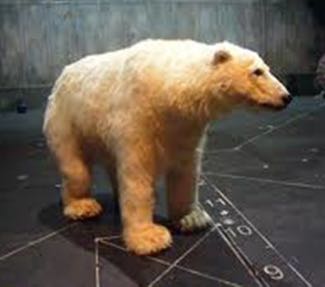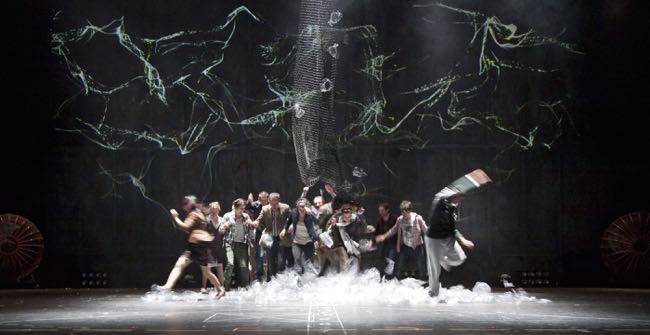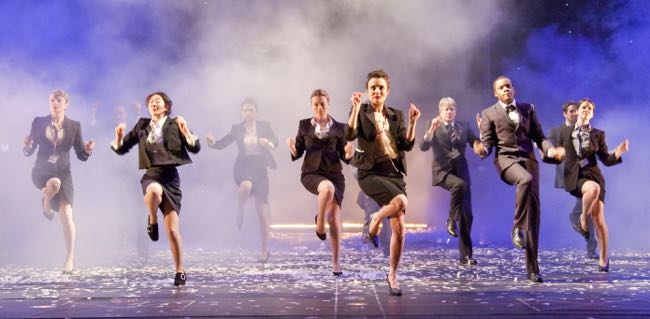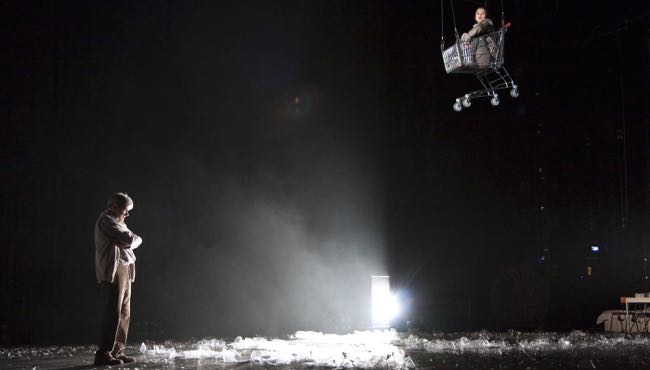By Ray Bennett
LONDON – A very convincing Polar Bear strolls onstage at one point in “Greenland,” the National Theatre’s ambitious but disappointing play about climate change but it’s about the only believable character in the production.
Four British playwrights, Moira Buffini, Matt Charman, Penelope Skinner and Jack Thorne, interviewed a raft of experts in order to devise the play, which has an impressive design but lacks focus and is woefully out of date.
 It’s a series of set pieces staged busily by director Bijan Sheiban that involve recurring characters in an assortment of settings from the Arctic Circle to the 2009 Copenhagen summit on climate change to the TV game show “Deal or No Deal”.
It’s a series of set pieces staged busily by director Bijan Sheiban that involve recurring characters in an assortment of settings from the Arctic Circle to the 2009 Copenhagen summit on climate change to the TV game show “Deal or No Deal”.
Designer Bunny Christie makes it a very big show with videos splashed large across the back of the stage that show maps, graphs, news footage, talking heads and, most effectively, a flock of Guillemots seeking shelter in the melting icepack at the North Pole.
There are some attempts at narrative with Lyndsey Marshal as Phoebe, a government aide looking for ammunition for the green cause from an intense researcher named Ray (Peter McDonald). His computer models that predict what will happen to the planet are terrifying in the extreme and he likes to play a game with Phoebe that he calls “the worst case scenario.”
One of them seems irrelevant but curious: the 500 million members of Facebook combine to pay off Africa’s debt and the US government closes down Facebook. But Phoebe works for the UK’s Labour government, which is ancient history since last year’s election put a coalition of Conservatives and Liberal-Democrats in power.
There’s a schoolboy, Harold (Sam Swann) who wants to study geography and we see him 34 years later as Harry (Michael Gould), a solitary monitor of what happens to birds and bears when the polar icecap begins to disappear. Gould is effective with some sorrowful lines about the beauty and tragedy of nature, and mankind’s role in its fate.
Isabella Laughland plays an earnest young woman named Lisa who is determined to do something, anything, to protest what is going on although she’s not very clear on what is going on. But Laughland captures the determination and charm of a committed youngster.
There’s a series of conversations between a mother and daughter who fail to communicate on any issue regarding efforts to lead a green life and leave the mother filled with uncomprehending guilt and deeply confused. She says, “On Monday, they say we’re all going to die and on Tuesday they want to sell me a pension.”
The politico and the researcher end up at Copenhagen with some representatives from Mali, and the videos show clips from the summit, but the description of what happened is out of date.
China’s carbon footprint, the impact of importing meat and fruit from far away countries, and the way supermarkets wrap it up in plastic are all invoked as matters of concern. There’s a lot of information and many sides of the issue are presented, often in eye-catching ways, but it becomes inevitably didactic.
The episodic production does serve to mirror what appears to be the world’s general confusion on how to proceed with all the things that affect the climate and there are some startling images. Attempts at humour are infrequent, though, and the play’s exchanges lack real bite. When the researcher suggests that the environment is not a religion, the politico insists heatedly, “Of course it is!”
Whatever it is, the National Theatre is right to address the subject even if this attempt is underwhelming. The most potent image of the night came at the end when from the theatre’s ceiling came tumbling masses of bits of paper of different sizes. Someone has to clean that up every night.
Venue: National Theatre, runs through April 2; Cast: Lyndsey Marshal, Peter McDonald, Isabella Laughland, Michael Gould, Sam Swann, Paul McCleary; Playwrights: Moira Buffini, Matt Charman, Penelope Skinner, Jack Thorne; Director: Bijan Sheibani; Dramaturg: Ben Power; Set designer: Bunny Christie; Lighting designer: Jon Clark; Video designer: Finn Ross; Music and sound: Dan Jones; Puppetry: Mark Down.
This review appeared in The Hollywood Reporter. Photos by Helen Warner.



